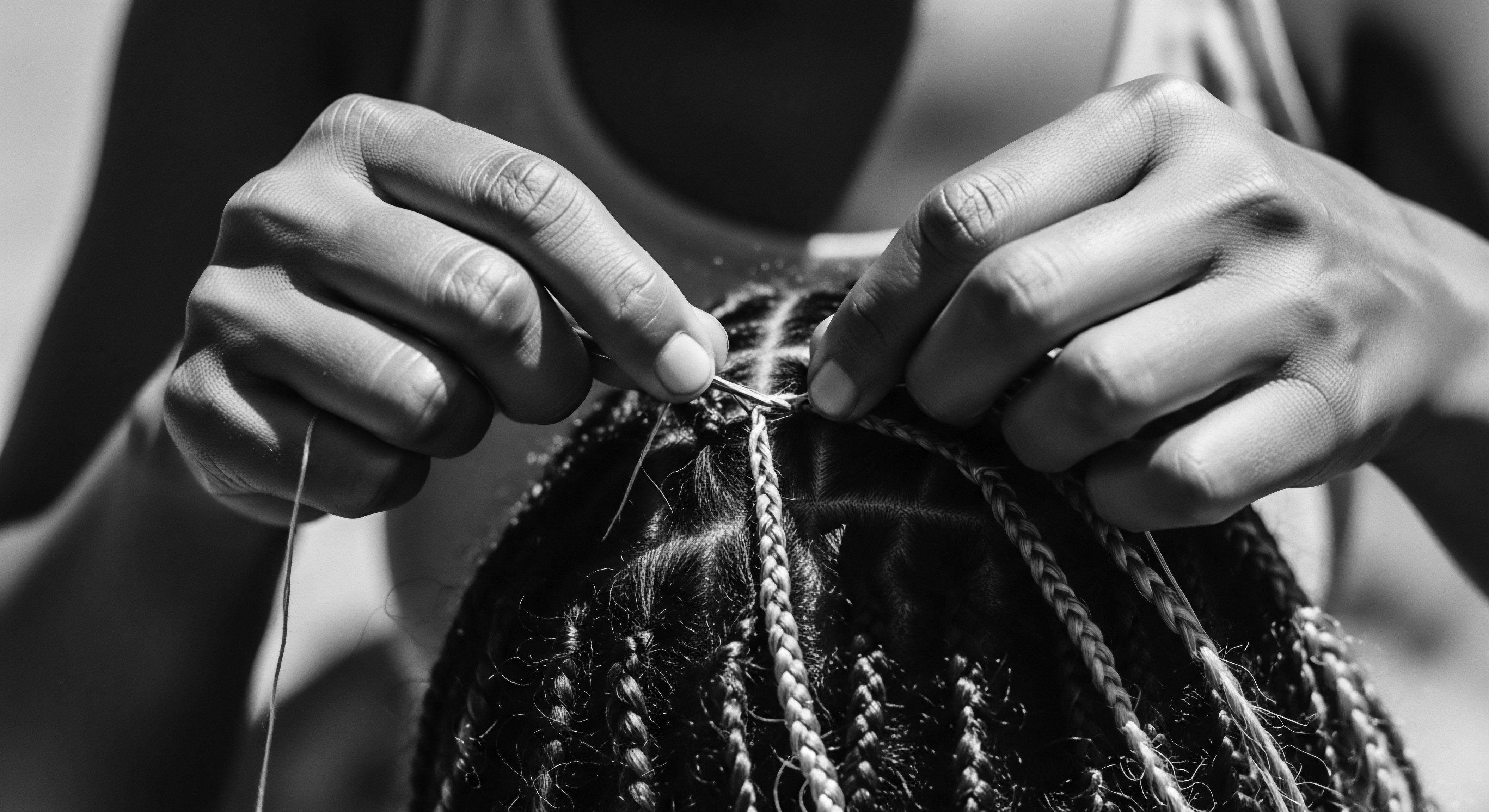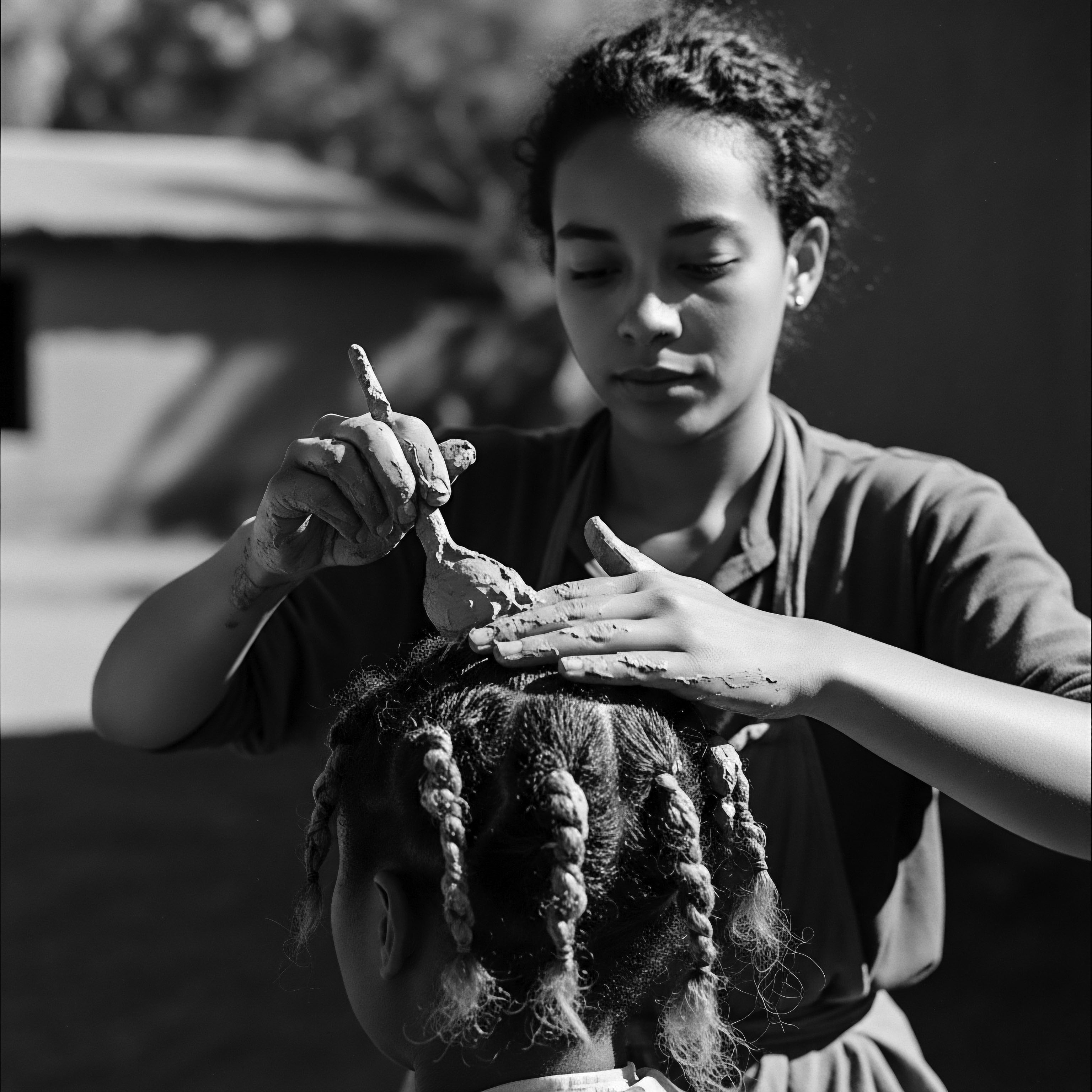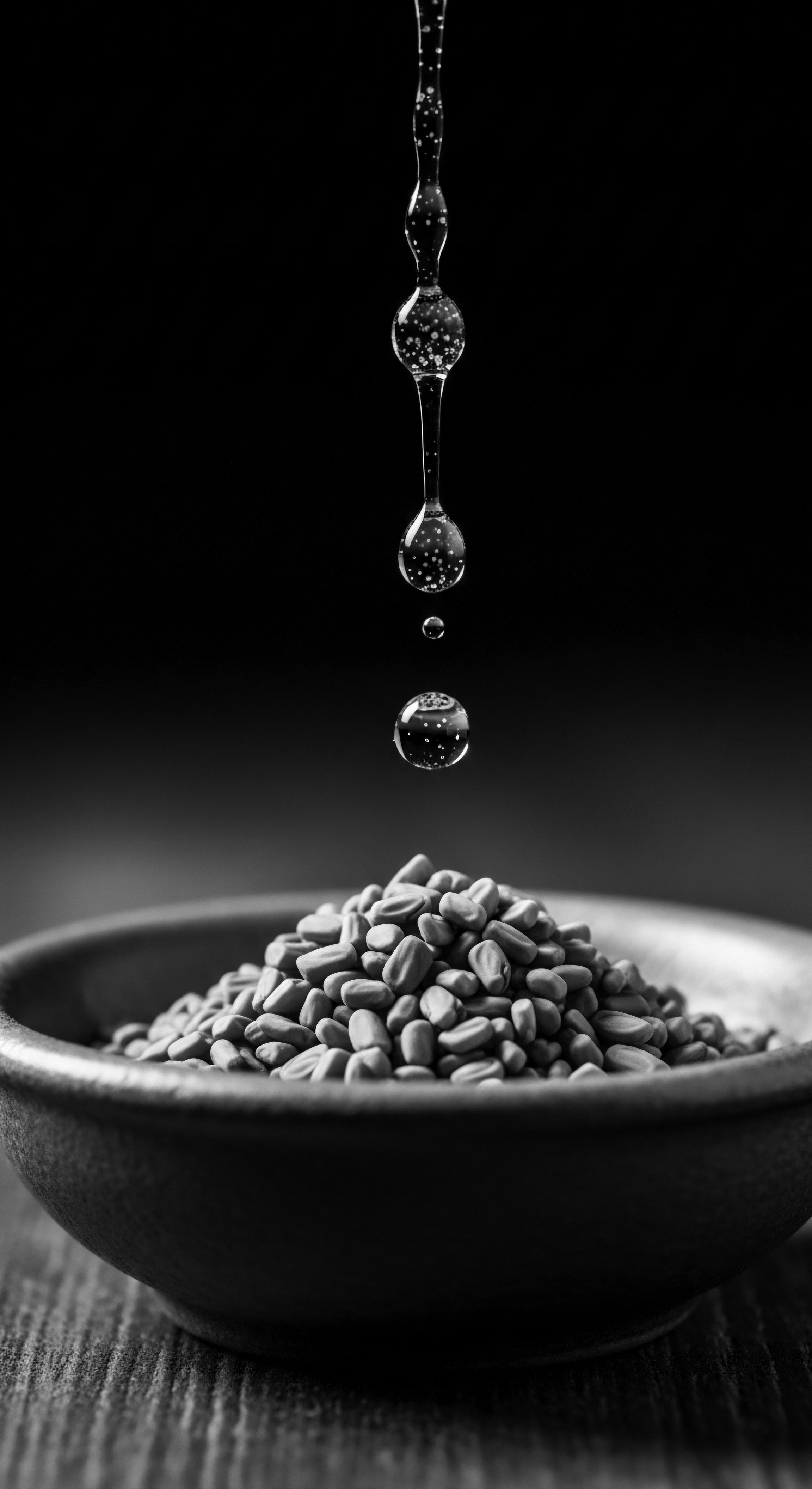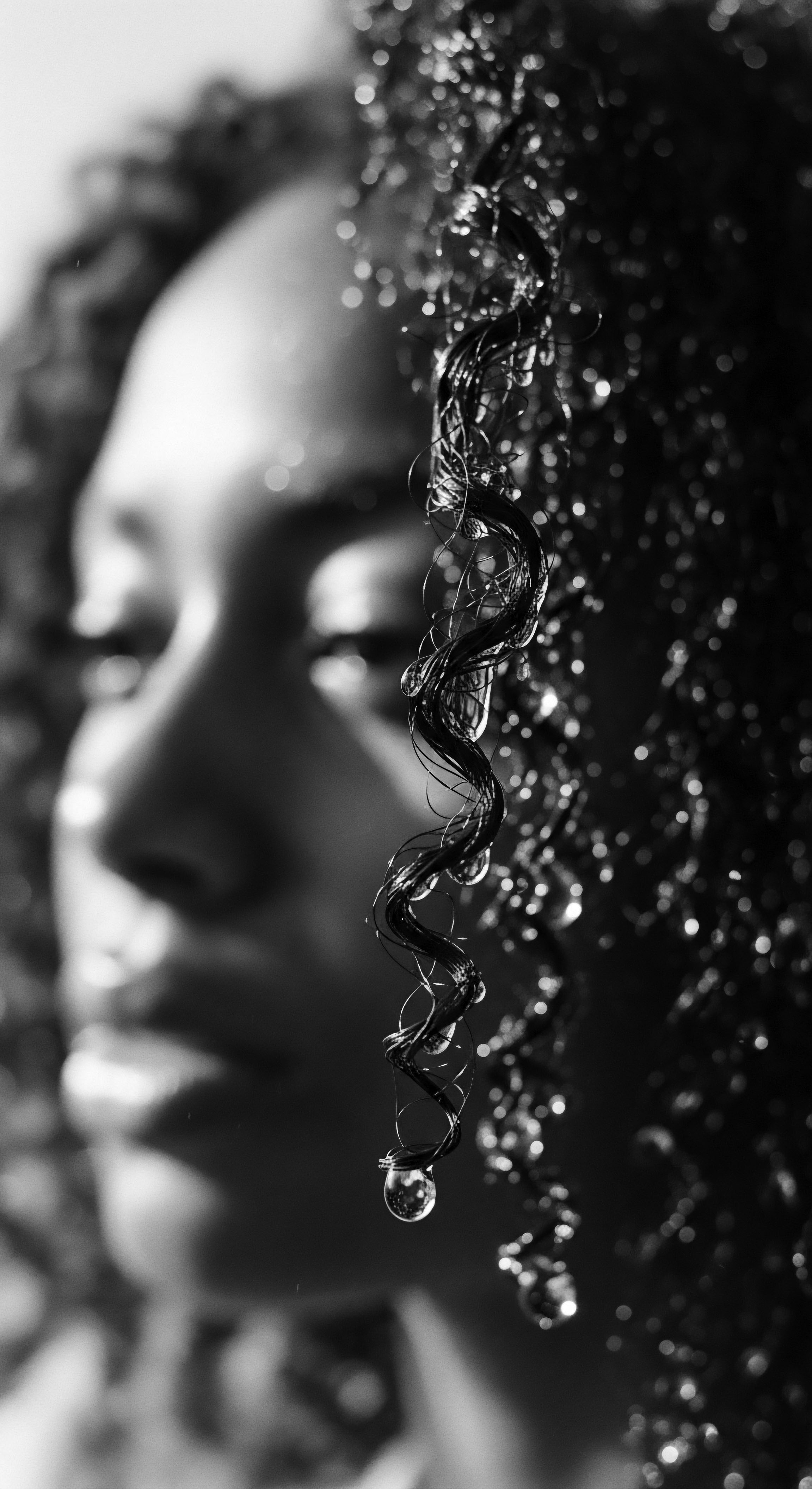
Fundamentals
Fermented rice, at its simplest, means rice that has undergone a process of biological transformation, usually by microorganisms such as yeast or bacteria. This ancient practice, commonly found in food preparation for millennia, takes the humble grain and unlocks a symphony of enhanced nutrients and active compounds within its starchy essence. When we speak of Fermented Rice in the realm of textured hair, we are generally referring to the liquid obtained from soaking or boiling rice, then allowing it to sit at room temperature for a period, encouraging beneficial microbial activity.
The resulting liquid, often cloudy and possessing a slightly sour scent, offers a wealth of constituents. These elements include various amino acids, the foundational building blocks of proteins, along with an array of vitamins ❉ notably B vitamins (like inositol) and vitamin E ❉ and antioxidants. These components contribute to its purported benefits for hair health, from strengthening strands to improving overall texture. The designation ‘Fermented Rice’ thus points to this biologically amplified concoction, a product of ancestral wisdom meeting elemental biology.
Fermented rice water transforms the simple grain into a nutrient-rich elixir, enhancing its innate benefits for hair through the ancient process of microbial activity.
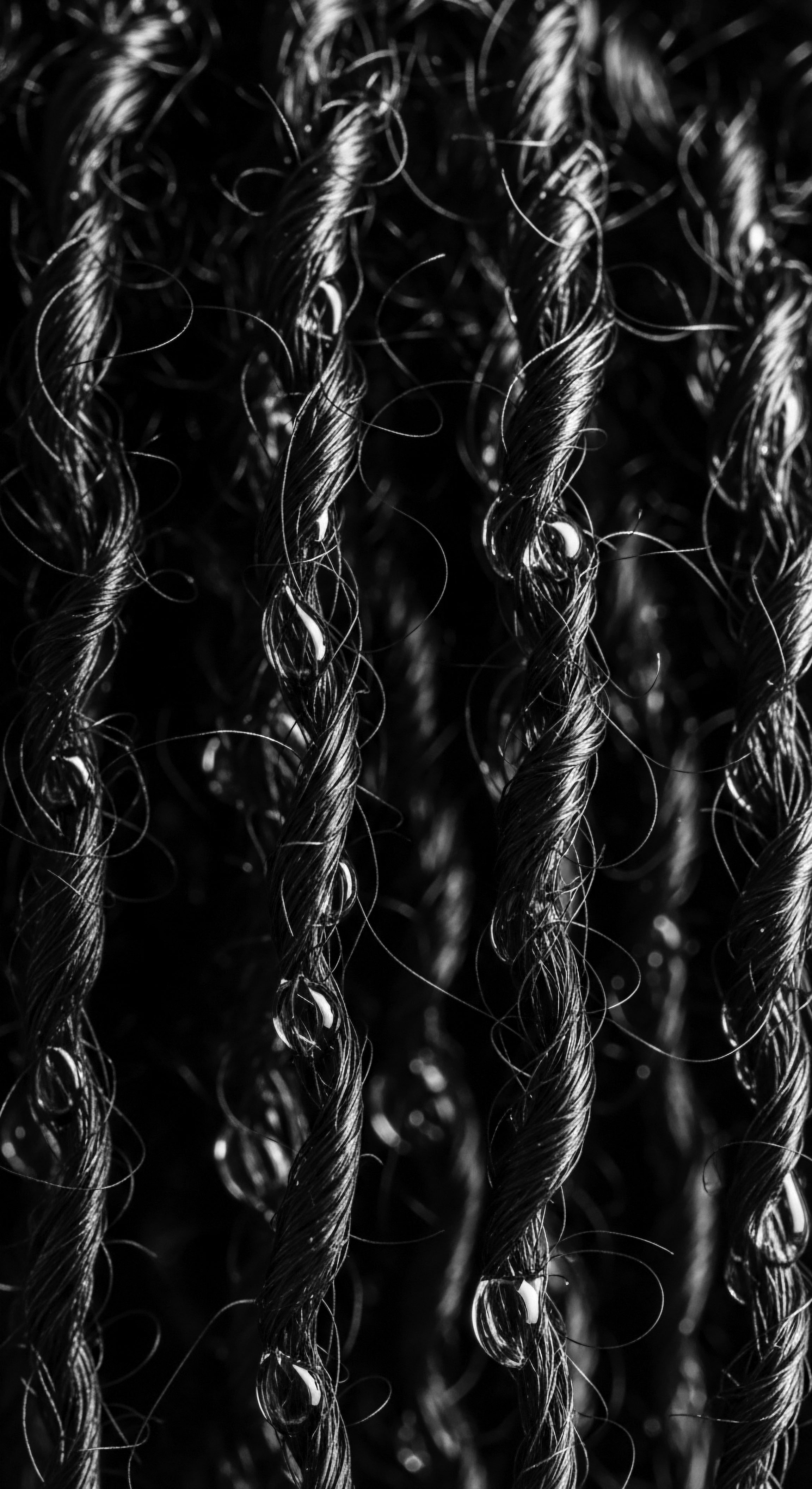
Preparation Methods
The creation of this potent hair treatment is an act of gentle alchemy, a practice passed down through generations. The primary methods for preparing fermented rice water are accessible and rooted in domestic wisdom.
- Soaking Method ❉ This method involves rinsing uncooked rice thoroughly, then steeping it in water, typically for about 30 minutes. The starchy liquid is then strained and left at room temperature for one to two days, allowing fermentation to begin. This is a gentle approach, preserving the integrity of the rice’s compounds.
- Boiling Method ❉ Another technique involves boiling rice with a greater volume of water than usual. After cooking, the starchy water is strained and collected. This concentrated liquid, once cooled, can also be left to ferment. This method often yields a richer solution, though heat can alter some proteins.
Regardless of the initial preparation, the crucial step involves allowing the liquid to undergo fermentation. This process, spanning typically 24 to 48 hours at room temperature, allows for the proliferation of beneficial microorganisms like yeast. These organisms break down the rice starch, converting it into components such as amino acids, lactic acid, and other organic acids, while also increasing antioxidant levels. The shift in pH towards a more acidic range (around 4.5-5.5) during fermentation is particularly noteworthy, aligning closely with the natural pH of human hair and scalp, which can contribute to smoother cuticles and enhanced shine.
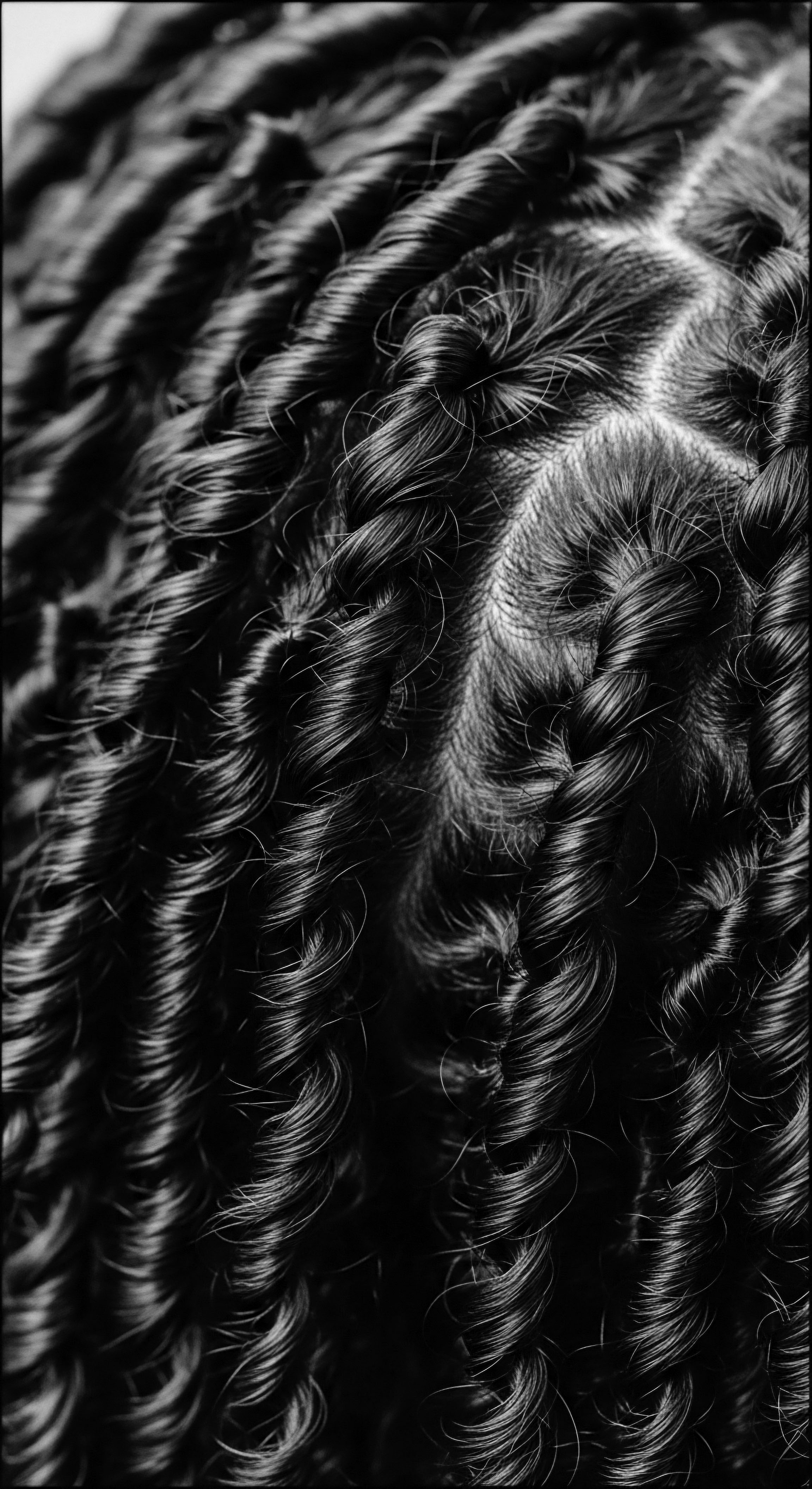
Intermediate
Fermented Rice, in its intermediate interpretation, goes beyond a basic explanation of preparation to encompass the profound impact of its constituent elements on textured hair, rooted deeply in centuries of care and ancestral practices. This interpretation considers how the natural processes within the rice water offer specific advantages that resonate with the unique architecture and historical needs of Black and mixed-race hair. The meaning here extends to its role as a botanical ally, a conduit of heritage and resilience for strands that have faced unique challenges.
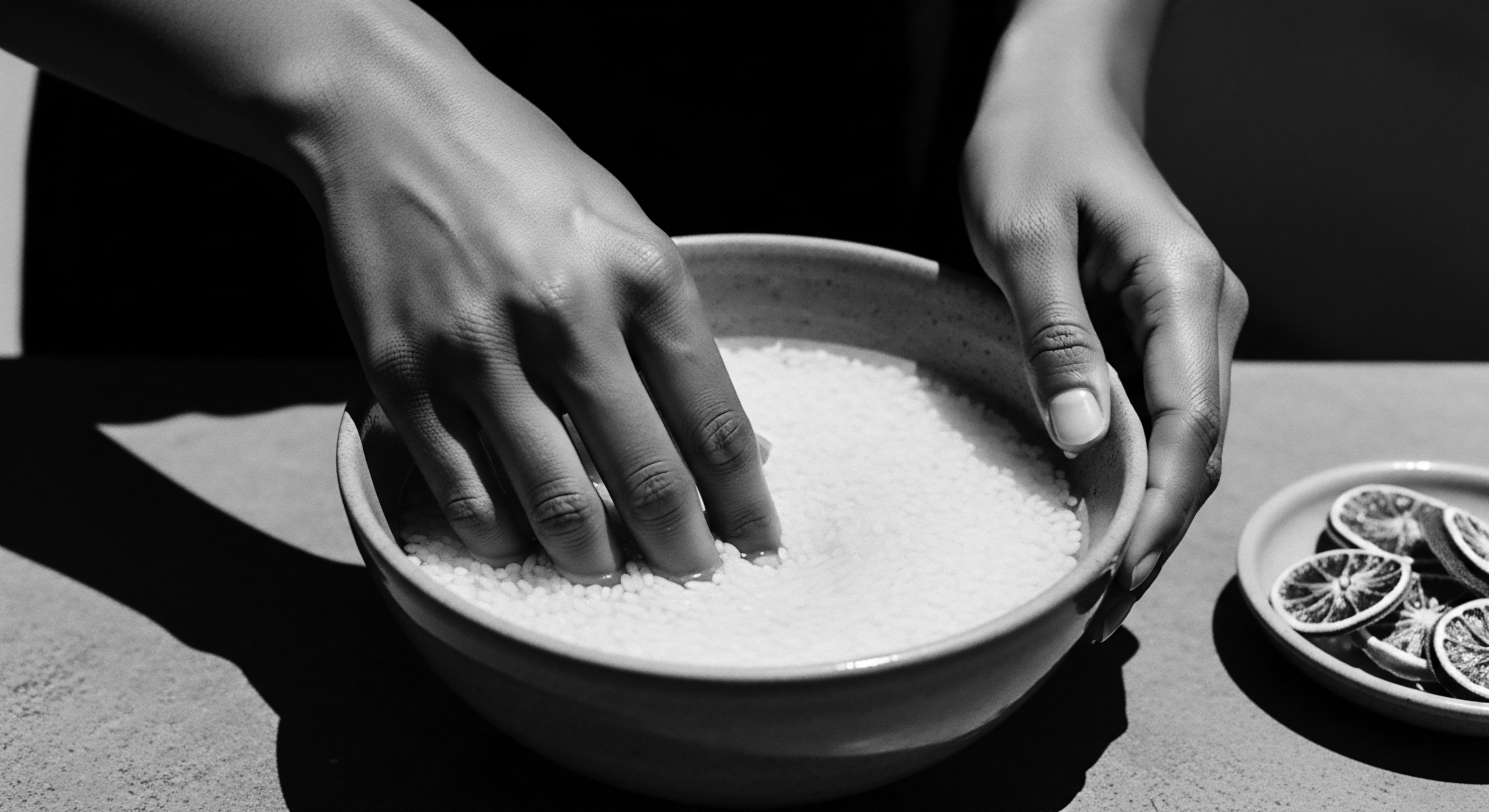
The Unveiling of Potency: Nutritional Composition
The transformation of rice water through fermentation is not merely a chemical reaction; it is an unveiling of deeper potency. During this period, the simple rice water, which already contains a baseline of vitamins and minerals, becomes a dynamic biological system. The microorganisms present act as tiny alchemists, breaking down larger molecules into smaller, more bioavailable forms. This process significantly increases the concentration of beneficial compounds.
Among these compounds, amino acids stand out as fundamental. Hair, primarily composed of a protein called keratin, benefits immensely from these building blocks. Fermented rice water delivers these amino acids directly to the hair shaft, supporting its integrity and aiding in repair.
Specifically, compounds like inositol, a carbohydrate, are believed to penetrate and remain within the hair fiber even after rinsing, offering sustained protection against damage and contributing to elasticity. The presence of B vitamins, particularly B8 (inositol) and B5 (panthenol), as well as vitamin E, further nourishes hair follicles and contributes to overall hair health.
The deep historical roots of fermented rice water reveal its cultural significance, as communities across Asia and beyond have long harnessed its power for lustrous hair.
Moreover, the fermentation process increases the presence of antioxidants. These compounds help combat oxidative stress on the scalp and hair, which can contribute to signs of aging, such as premature graying. The slightly acidic pH of fermented rice water, achieved during the fermentation, helps to seal the hair’s cuticle, resulting in smoother strands that reflect light with greater shine and experience less friction. This alignment with the hair’s natural acidity fosters a healthy scalp environment, reducing irritation and supporting optimal hair growth.

Cultural Resonance and Ancestral Practices
For textured hair, particularly within Black and mixed-race communities, the connection to natural ingredients and time-honored practices holds deep meaning. Fermented rice water, though often attributed to East Asian traditions, aligns with a broader ancestral wisdom of working with nature’s offerings for hair care. Across the African diaspora, the reliance on plant-based ingredients and communal hair rituals speaks to a heritage of resourcefulness and self-preservation.
While explicit historical accounts of fermented rice water use within traditional African hair care practices are less commonly documented than those from East Asia, the underlying philosophy of utilizing natural, bio-transformed ingredients for hair health is a shared legacy. For example, traditional African communities utilized ingredients like shea butter, coconut oil, and aloe vera for nourishment and protection, often incorporating plants and herbs into their routines. Some communities even used fermented milk butter to maintain hair softness and shine.
These practices highlight a parallel understanding of the potency of natural ferments and nutrient-rich botanicals in promoting hair vitality. This common thread of seeking wellness from the earth’s bounty unites diverse ancestral approaches to hair care.
The practice of hair care within these communities has historically been a significant cultural legacy, a source of identity, and a symbol of resilience. From intricate braiding traditions that conveyed social status and tribal affiliation to the resourceful adaptation of available natural ingredients, hair has always told a story. The very act of caring for hair, often a communal activity, strengthened bonds and preserved cultural identity, even through periods of immense hardship and forced assimilation. Therefore, the inclusion of fermented rice water within a modern textured hair routine becomes more than a product application; it becomes an homage to these enduring traditions, a respectful continuation of a lineage of care.
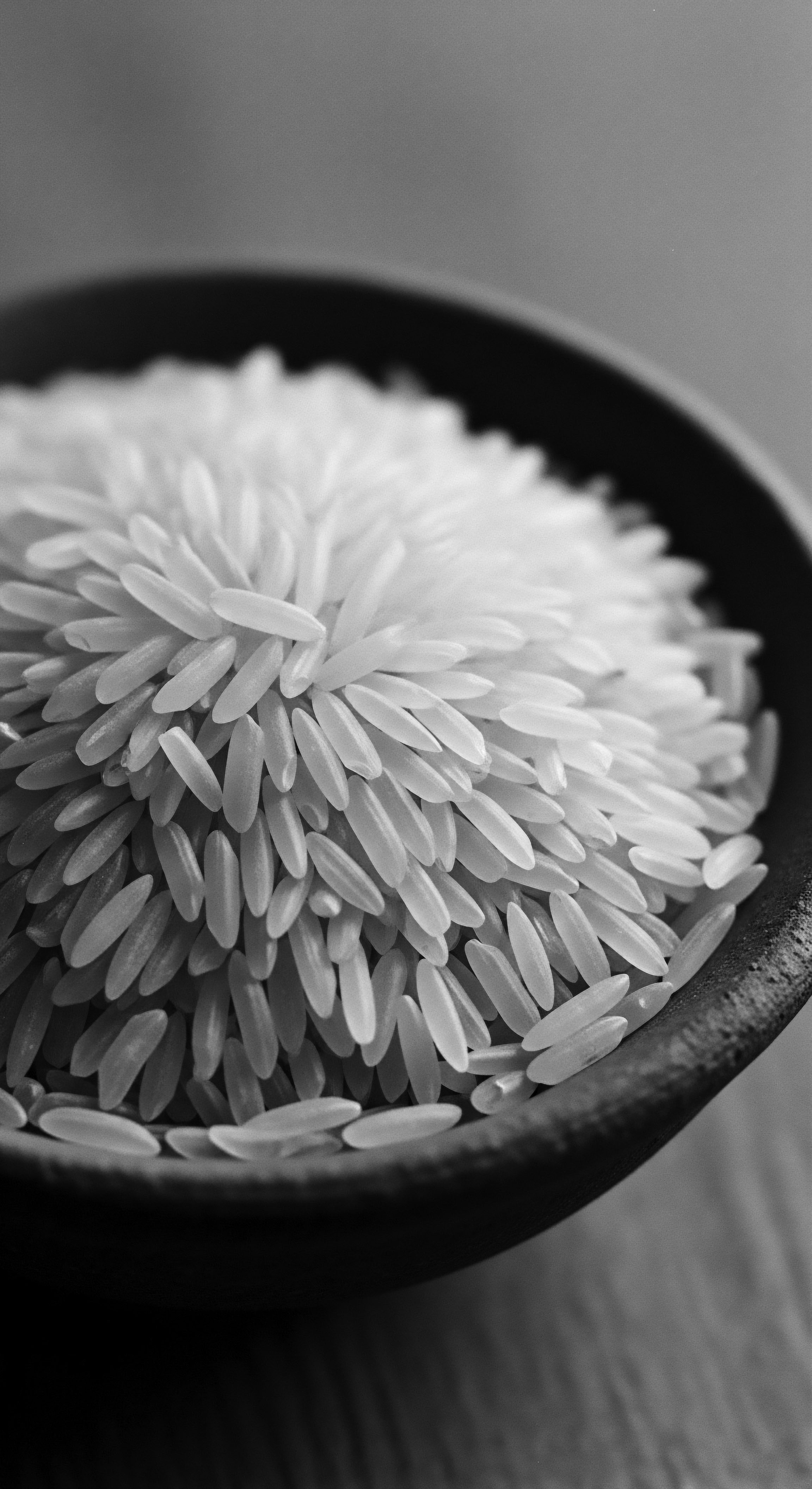
Academic
The academic meaning of Fermented Rice transcends a simple definition, requiring a rigorous intellectual exploration of its biomechanical impact, its profound historical and anthropological context within global hair care traditions, and its socio-cultural implications for textured hair. This examination demands a critical lens, drawing from robust research to delineate its complex composition, mechanisms of action, and cultural significances, moving beyond anecdotal claims to a grounded understanding. The meaning of Fermented Rice is thus rooted in both empirical observation and a nuanced appreciation of its cultural trajectory, especially as it relates to the heritage of Black and mixed-race hair. It denotes a substance whose elemental origins hold intricate biological secrets, secrets unlocked through age-old processes and now increasingly validated by modern scientific inquiry.
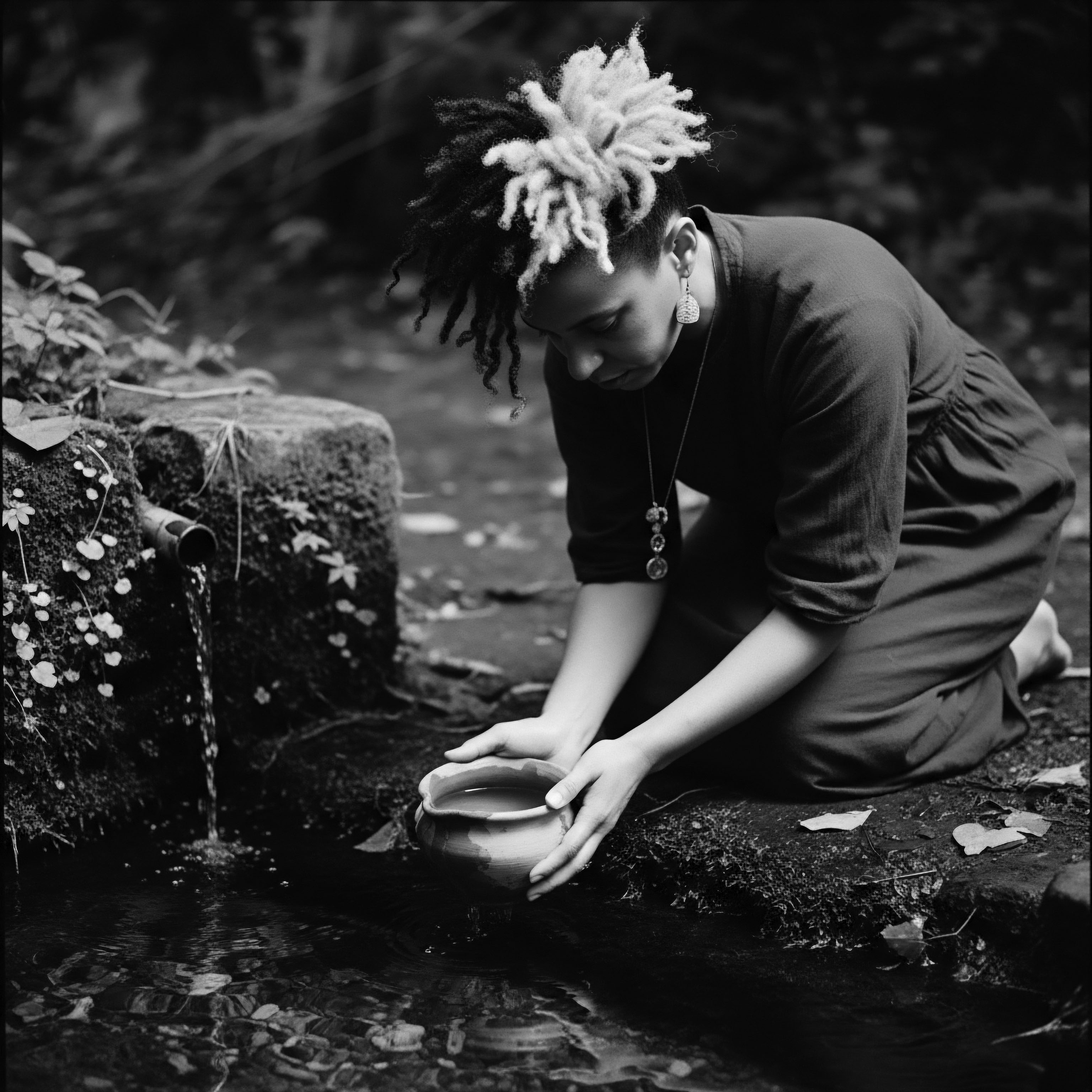
The Biomechanical Delineation of Fermented Rice
From a scientific perspective, Fermented Rice, specifically fermented rice water (FRW), is a biologically enhanced aqueous solution derived from the steeping or boiling of rice grains, followed by a period of microbial fermentation. This process, typically facilitated by indigenous microorganisms like Saccharomyces yeast and lactic acid bacteria, induces a cascade of biochemical transformations within the rice water. Initially, rice grains, primarily composed of starch (approximately 75-80%), release these carbohydrates into the water. During fermentation, the microorganisms metabolize these starches, yielding a complex array of compounds not as readily available in unfermented rice water.
The resultant liquid is notably rich in amino acids, the fundamental units of proteins, which are essential for hair structure and integrity. Hair itself is largely composed of keratin, a protein, and the amino acids present in fermented rice water, such as cysteine and methionine, serve as critical building blocks that help fortify the hair shaft. Beyond amino acids, FRW is a source of various vitamins (particularly B vitamins like inositol and panthenol, and vitamin E), minerals, and heightened concentrations of antioxidants, including ferulic acid. These antioxidants combat oxidative stress on the hair and scalp, a factor known to contribute to cellular damage and premature aging.
One of the most scientifically compelling components of FRW is inositol (Vitamin B8). Research indicates that inositol possesses a unique ability to penetrate the hair cuticle and remain within the hair fiber even after rinsing. This suggests a sustained protective and reparative effect from within the hair shaft, contributing to increased elasticity and reduced breakage.
The fermentation process itself also modulates the pH of the rice water, shifting it from a potentially alkaline state to a slightly acidic range, typically between 4.5 and 5.5. This pH alignment with the hair’s natural acidic mantle helps to flatten and seal the cuticle layers, resulting in enhanced smoothness, shine, and a reduction in surface friction.
A recent study, for instance, investigated the effect of fermented rice water on hair growth over a 30-day period using 30 human subjects. The research utilized various rice types, including a mixture of ambemohar, kolam, and basmati rice, and found that formulations containing fermented rice water led to an observed increase in hair growth rate, surpassing the average growth rate. This study also noted an improvement in hair quality, with subjects reporting increased smoothness and decreased hair fall.
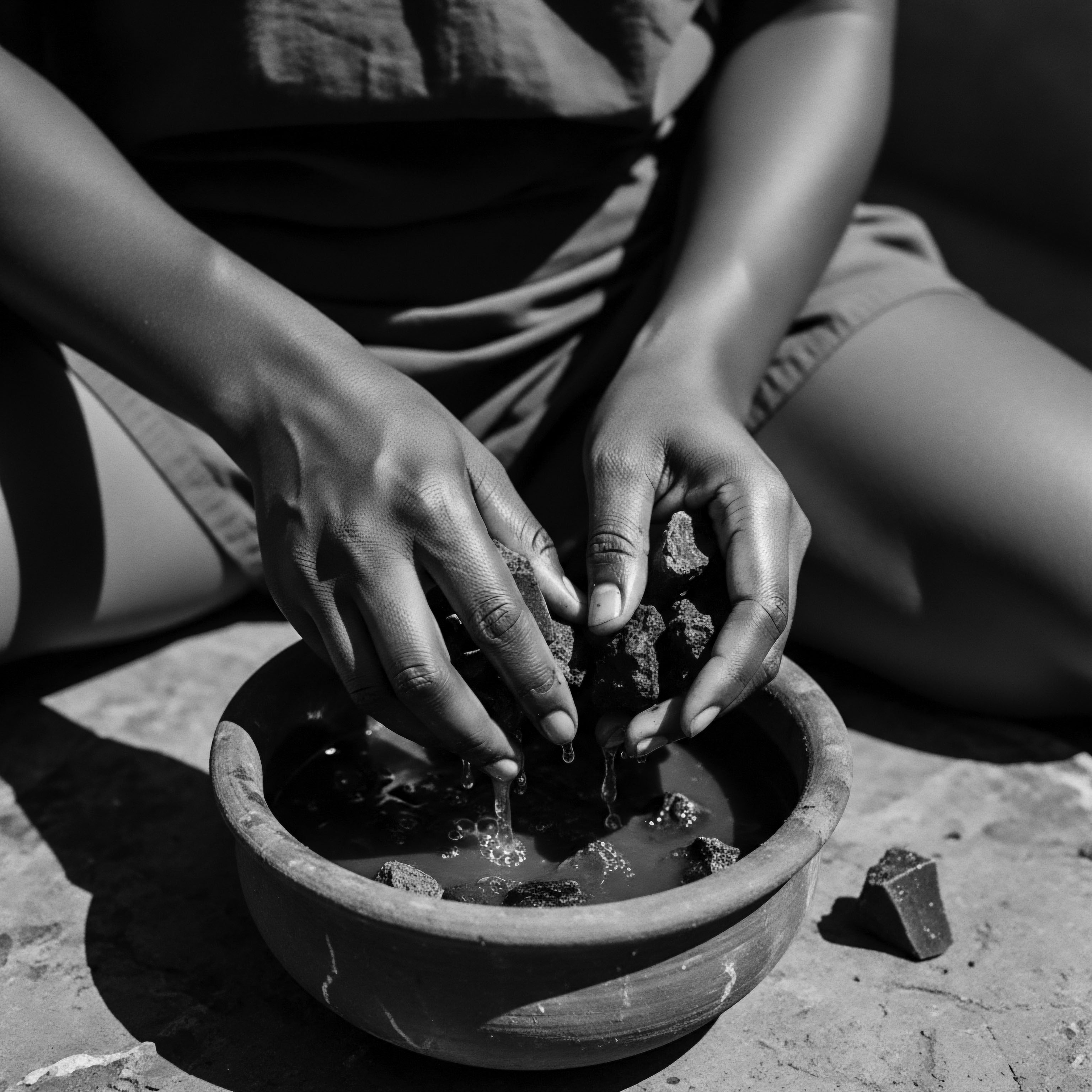
Interconnected Dynamics: Scalp Health and the Microbiome
The meaning of Fermented Rice extends to its influence on scalp health, a critical aspect often overlooked in superficial hair care discussions. The scalp is a dynamic ecosystem, home to a complex microbiome of bacteria and yeasts. The beneficial microorganisms and mild acids produced during fermentation in FRW can contribute to rebalancing this ecosystem.
This rebalancing can help soothe irritation, alleviate dryness, and potentially mitigate issues like dandruff. A healthy scalp environment, in turn, provides the optimal foundation for robust hair growth, underscoring the holistic impact of this traditional remedy.
The notion of utilizing fermentation for enhanced cosmetic efficacy finds parallels in the broader scientific community. Fermented ingredients are increasingly recognized for their increased bioavailability, allowing nutrients to be more readily absorbed by the skin and hair. This aligns with the understanding that the breakdown of larger molecules into smaller peptides and other compounds through fermentation can improve their functional properties.

Cultural Topographies: Tracing Heritage in Hair Practices
The academic meaning of Fermented Rice is inseparable from its rich cultural and historical significance, particularly as it intersects with the heritage of textured hair. While the most widely cited examples originate from East Asia, such as the storied practice of the Yao women of Huangluo Village in China, whose hair averages an astounding six feet in length and retains its color well into their eighties due to consistent use of fermented rice water, the underlying principles of reverence for natural ingredients and communal hair care resonate across diverse ancestral traditions.
Hair has always possessed profound cultural meaning across global communities, serving as a powerful emblem of identity, social status, and spiritual connection. For African and diasporic communities, hair care practices were deeply ingrained rituals, often communal in nature, reinforcing kinship and preserving cultural identity even amidst the brutal ruptures of slavery. During the transatlantic slave trade, the deliberate shaving of enslaved Africans’ heads aimed to strip them of their identity and sever ties to their heritage. Despite such dehumanizing efforts, African women and girls maintained a continuity of care, adapting available resources to nurture their hair.
Fermented rice water, though often associated with East Asian traditions, embodies a universal ancestral wisdom of nurturing hair with nature’s transformative power, a practice echoing resilience across the diaspora.
This history reveals a continuous thread of ingenuity and self-determination in Black hair practices. While direct documented evidence of fermented rice water use specifically in traditional African hair care is scarce in current literature, the broader principle of utilizing fermented ingredients for beauty and wellness is not unfamiliar within African historical contexts. For instance, some traditional African communities employed fermented milk butter for softening and shining hair, demonstrating a long-standing knowledge of the benefits of bio-transformed natural substances.
This shared ethos of working with natural ferments, whether rice, milk, or other botanicals, signifies a collective human understanding of their efficacy. Hair care rituals were never merely about aesthetics; they were acts of resistance, self-expression, and deep cultural continuity.
The modern resurgence of interest in fermented rice water for textured hair, therefore, signifies more than a fleeting trend. It represents a deeper connection to ancestral wisdom, a reclaiming of agency in hair care rooted in historical practices that prioritize natural efficacy. It stands as a testament to the enduring legacy of communities who understood the subtle yet potent transformative power of natural processes. This pursuit of ancestral knowledge, coupled with scientific validation, allows for a more informed and culturally responsive approach to textured hair care, honoring the journeys of strands through time.
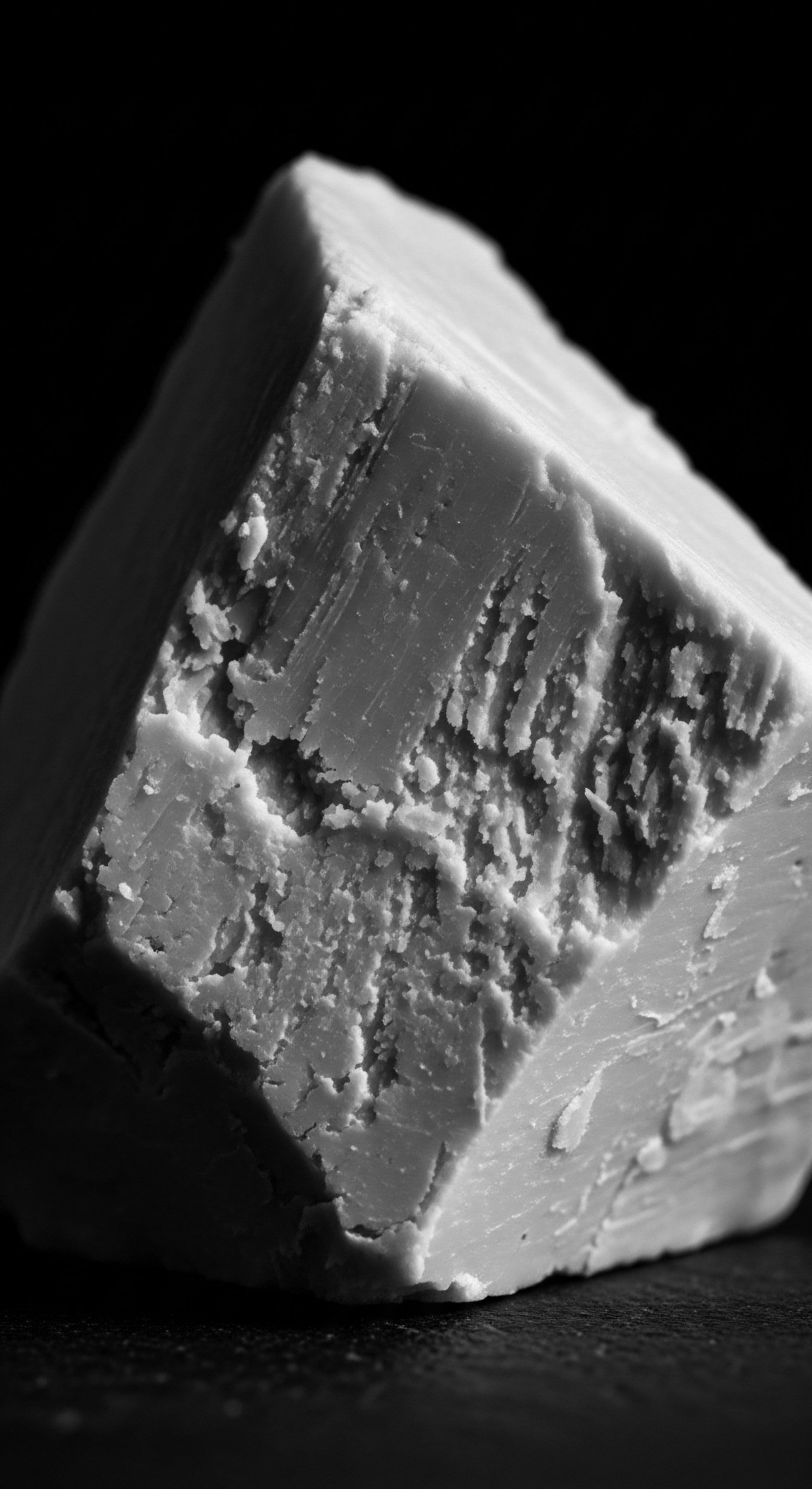
Reflection on the Heritage of Fermented Rice
As we consider the journey of Fermented Rice, from its elemental biological origins to its revered place in diverse hair traditions, we observe a profound testament to ancestral wisdom. The narratives of long, healthy hair, meticulously cared for across generations, are not simply charming tales. They are living archives of human ingenuity and deep respect for the natural world. For textured hair, especially within Black and mixed-race communities, the current renewed interest in fermented rice water carries a weight of recognition.
It acknowledges the universal truth that our hair, in its myriad forms, connects us to a lineage of care, resilience, and identity. The wisdom held in each strand reaches back through time, echoing stories of survival, self-definition, and unwavering beauty in the face of adversity. This profound connection is a source of genuine pride.
The journey of Fermented Rice, therefore, is not a destination. It remains an ongoing conversation between the past and the present, between ancient rituals and evolving scientific understanding. It calls upon us to look beyond immediate trends, to truly listen to the whispers of our ancestors, and to honor the pathways they cleared for us in self-care. The subtle strength imparted by this ancient elixir encourages us to celebrate the unique beauty of every curl, coil, and wave, recognizing them as powerful expressions of a heritage that continues to shape our present and guide our future.
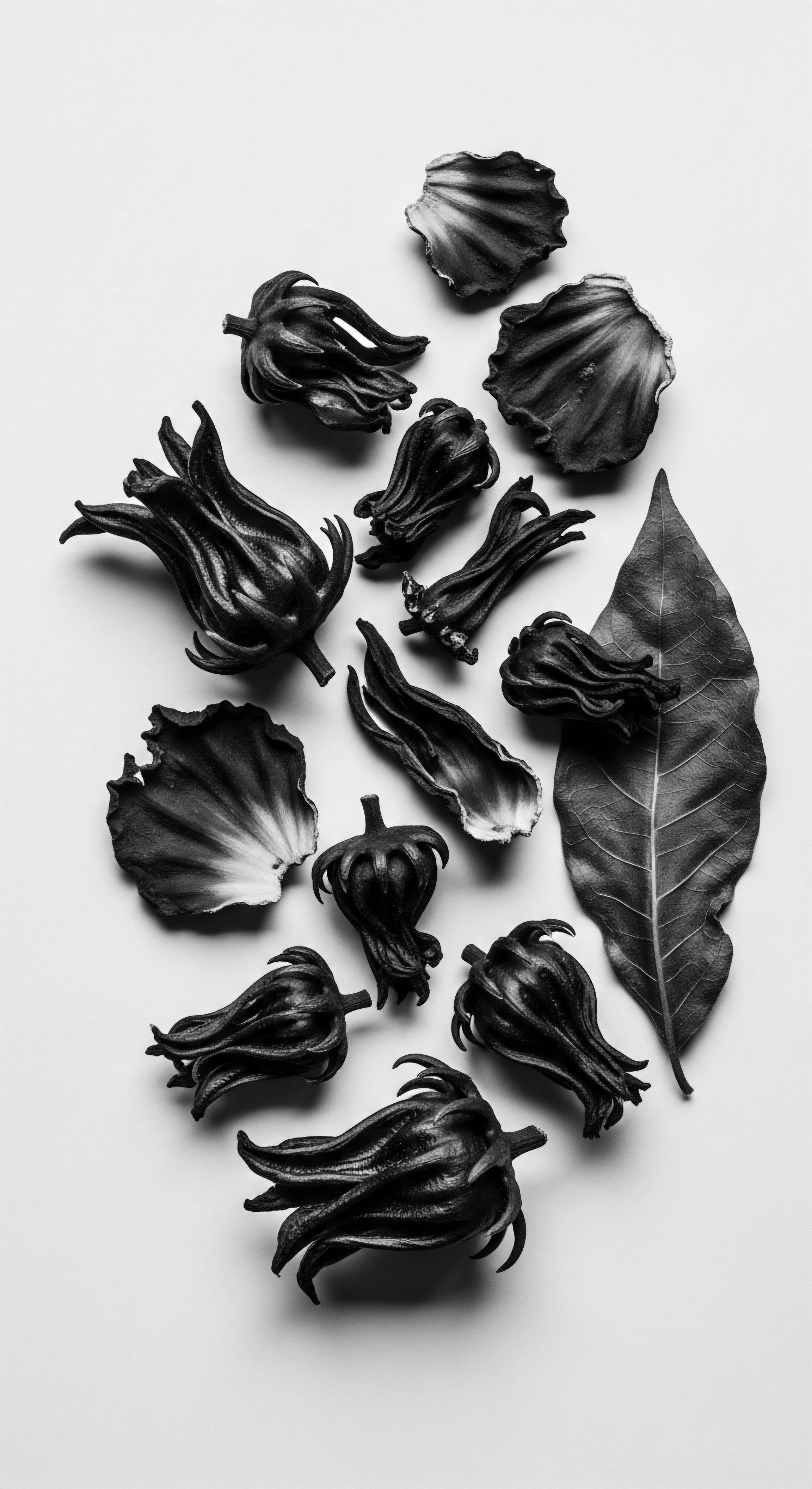
References
- The Benefits Of Rice Water For Hair Growth And How To Use It – ELLE. (2025-05-30)
- Rice water for hair: Benefits and how to use it – Medical News Today. (2024-12-04)
- Fermented Rice Water For Hair: History and Get it Now – Yao Secret. (2023-12-19)
- Rice Water For Hair And Scalp: Benefits & Recipe. (2023-09-29)
- Rice Water Secrets for Hair Growth ❉ What Experts Want You to Know – ELLE. (2025-05-28)
- EFFECT OF FERMENTED RICE WATER ON HAIR – Journal of Emerging Technologies and Innovative Research.
- Unlocking the Traditions of Red Yao Women’s Holistic Hair Care – Yao Secret.
- Hair Care Practices from the Diaspora: A Look at Africa, America, and Europe. (2025-01-23)
- Black Hair and Hair Texture: Cultivating Diversity and Inclusion for Black Women in Higher Education | Emerald Insight. (2023-10-09)
- Learn About Washing Hair with Fermented Rice Water at the World’s Longest-Hair Village. (2024-04-11)
- Why You Should Be Incorporating Rice Water Into Your Hair Routine – Cécred. (2025-02-18)
- A guide to the ancient tradition of using rice water for beautiful skin and hair. – GingerChi. (2020-05-19)
- Rice Water in Hair: Benefits, How-To’s, & More | Cécred. (2025-03-25)
- The Historical Significance of Rice Water Shampoo: A Cultural and Scie. (2023-11-23)
- The Rice Revolution: How Traditional Red Yao Rice Water Practices Are Transforming Modern Hair Care – VIORI Shampoo Bars. (2025-05-25)
- Beyond the Basics: The Science and Art of Rice Water for Hair Health. (2025-05-30)
- Exploring the Wonders of Fermented Rice Water for Hair Vitality | Clinikally. (2024-02-29)
- Rice Water for Hair: Benefits & How to Use – Curlsmith.
- The Best Rice Water Hair Rinse Routine & How I Endded My 1.5 Year of Sebum-Only Hair Cleansing Routine. – Happy Earth Farm.
- A Journey Through Black Hair Care: From Traditional Practices to Modern Innovations. (2024-09-03)
- How African American Women Cosmetologists Can Help to Reimagine STEM Education – International Journal of Gender, Science and Technology.
- Could fermentation be the next big thing in skincare? – Harpers bazaar. (2023-01-19)
- African Hairstyles: Cultural Significance and Legacy – Afriklens. (2024-11-01)
- Black Women and Identity: What’s Hair Got to Do With It? – University of Michigan.
- Space, race and identity: An ethnographic study of the Black hair care and beauty landscape and Black women’s racial identity constructions in England | Request PDF – ResearchGate. (2025-05-29)
- Fermented Rice Water: A Natural Elixir for Beauty and Health – Agri Articles. (2023-07-14)
- Fermented Rice Water Explained | Gallinée.
- Skin Care Trends 2022: Fermented Beauty – Jarvis Cosmetic Developments.
- The Secret Science of Rice Water Hair Spa: Fermentation, Scalp Health, and Shine. (2025-05-19)
- The Amazing Skincare Benefits of Fermented Ingredients! – Nourished Life.
- Formulation and Evaluation of Fermented Rice Water Herbal Shampoo For Antihairfall Activity – International Journal of Pharmaceutical Research and Applications (IJPRA). (2023-01-19)
- The Magic of Mielle’s Rice Water: Transform Your Hair with Ancient Wis. (2025-05-13)
- No raw oils and butters vs. Traditional African hair care?: r/Naturalhair – Reddit. (2021-08-26)

